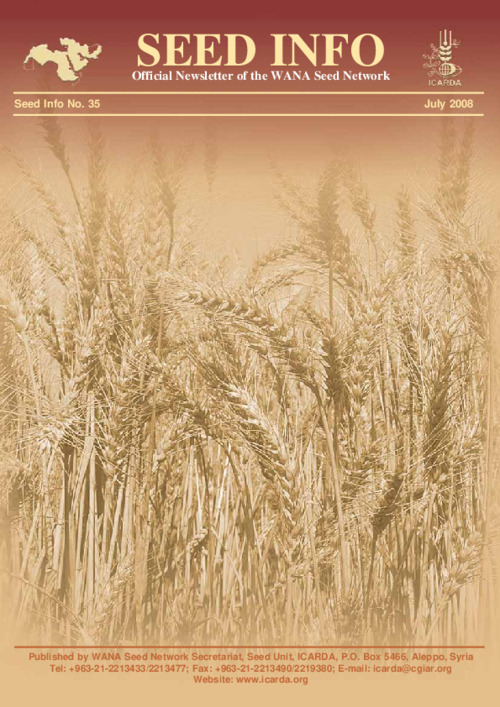Seed Info No. 35
Abstract
Seed Info aims to stimulate information exchange among seed staff in the Central and West Asia and
North Africa (CWANA) region. The purpose is to help strengthen national seed programs, and thus improve the supply of quality seed to farmers.
History was made on 18 July in Istanbul, when the formation of a new regional seed association was announced, by the 10 member countries of the Economic Cooperation Organization (Afghanistan, Azerbaijan, Iran, Kazakhstan, Kyrgyzstan, Pakistan, Tajikistan, Turkey, Turkmenistan, Uzbekistan). The
announcement followed a two-day meeting, held under a regional Technical Cooperation Project
supported by FAO and implemented jointly with ICARDA.
In traditional agriculture, genetic resources management, crop improvement, production and seed supply are all integrated at farm level. In modern agriculture, however, breeding and seed production have evolved into specialized but highly integrated components. This specialization gradually gave birth to the modern seed industry, which continues to grow and evolve, with many structural changes and recently at a very fast pace. In the NEWS AND VIEWS section Bernard Le Buanec, former ISF Secretary General, 
provides insights on how regulatory change and the technology revolution have changed the seed world.
Frederick Schreurs, from ASTEC-Global, the Netherlands, presents new seed technology solutions for the industry. The need for seed technology solutions started with the beginning of agriculture particularly for cleaning seeds prior to planting. With progress in agriculture and seed technology, new techniques emerged including soaking, priming, disinfecting, and seed treatment using slurry, dusting, coating,
pelleting and encrusting technology. These technologies, for example cleaning and treatment, were initially custom-applied by specialized companies, but later on handled inhouse by seed companies. With the development of new and simple technologies, some of the techniques for seed treatment and quality assurance are now available for use by small seed companies or local seed producer groups. There is also news on ISF seed congress in 2008, ISTA’s Green Certificate, approval of GM crops in Egypt and public-private partnership on hybrid rice technology by IRRI and partners.
The section on SEED PROGRAMS includes news from Iraq, Morocco and Pakistan. The news from Afghanistan focuses on a first local seed storage facility constructed for VBSEs through the support of Afghanistan Small and Medium Enterprise Development in Nangarhar province. We also report on ongoing efforts for the rehabilitation and development of the national seed industry in Iraq; the status of plant variety protection in Morocco; and on the vegetable seed project by Pakistan’s Federal Seed Certification and Registration Department. The RESEARCH section aims to capture information on adaptive research or issues relevant to seed program development in the region and beyond. Asrat Asfaw from the Southern Agricultural Research Institute writes about participatory ‘mother-baby’ trials in common bean breeding in southern Ethiopia. 
Seed Info encourages the exchange of information on the national, regional, and global seed industry

